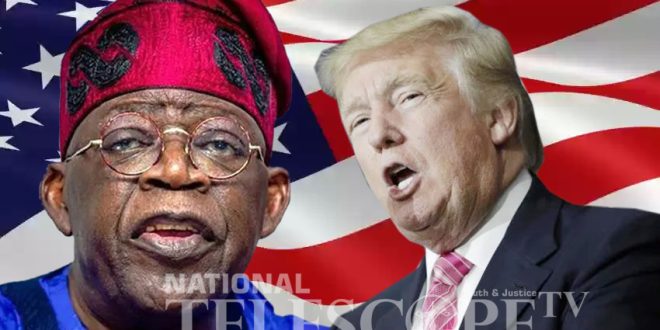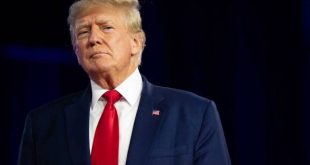By Olumide Olusegun and Olatunde Oluwasola
As the political landscape in Nigeria gears up for the 2027 presidential election, a new wave of verbal sparring has emerged among the major political parties, particularly the ruling All Progressives Congress (APC), the opposition Peoples Democratic Party (PDP), and the Labour Party (LP).
The recent outcome of the 2024 U.S. presidential election, in which former President Donald Trump made a stunning political comeback to defeat incumbent Vice President Kamala Harris, has sparked a series of heated exchanges across the Nigerian political sphere, with each party trying to gain the upper hand ahead of the 2027 polls.
This is as the APC issued a stern warning to opposition parties not to get too carried away by the outcome of the U.S. election.
Following Trump’s victory, APC’s National Publicity Director, Bala Ibrahim, expressed confidence that President Bola Tinubu would win a second term in 2027, largely due to his government’s ongoing reforms and anticipated economic recovery.
Bala’s comments came as a direct response to the jubilant reactions from opposition parties who seemed to draw parallels between the U.S election results and the possibilities for Nigerian politics in 2027.
He emphasised that while the U.S electoral system may offer some lessons, the political dynamics in Nigeria remain vastly different.
According to Bala, the success of the APC in 2023 was built on a foundation of trust and unity among Nigerians who voted for change, and he believes this support will only grow stronger in the coming years.
“The APC is not losing sleep over any threat from the opposition,” Bala stated in an interview.
“With the way President Tinubu is transforming the country, bringing in painful but necessary reforms, Nigerians will begin to see the fruits of these changes in the run-up to the 2027 election. By then, the people will be clamouring for continuity.”
He further added, “The APC government is not resting on its laurels. We are already strategising ahead of the next election, and we are confident that the progress we are making will ensure that no outsider, especially one who has failed Nigeria in the past will stand a chance in 2027.”
Meanwhile, opposition parties have taken a more critical stance, pointing to the need for electoral reforms and better governance as key issues in the lead-up to the 2027 election.
The Labour Party, particularly, has seized upon the lessons learned from the U.S election, with its National Publicity Secretary, Obiora Ifo, suggesting that Nigeria could benefit from a similar commitment to democracy and voter integrity.
According to Ifo the U.S electorate chose to disregard the power of incumbency in their presidential election, a practice that remains deeply entrenched in Nigerian politics.
He suggested that Nigeria’s Independent National Electoral Commission (INEC) could learn from the transparency and independence exhibited during the U.S elections, which, according to him, was a “true test of democracy.”
“The U.S election shows that incumbency can be overcome if the people speak with one voice,” Ifo remarked.
“In Nigeria, we are still battling with an electoral system that is marred by the heavy influence of the ruling party, security agencies, and other manipulative tactics.”
He added that the political system in Nigeria should shift away from the dominance of a few powerful elites who use their positions to intimidate and suppress opposition parties.
Similarly, the New Nigeria Peoples Party (NNPP) also joined the fray, with its spokesman Ladipo Johnson questioning when Nigeria would break free from the era of political leaders using state resources and security forces to intimidate their rivals.
“We need to end this culture of tight-fisted leadership that stifles opposition and undermines the democratic process,” Johnson said.
“While the U.S election proves that change is possible, the question is, when will Nigeria’s electoral process mature to that level?”
One of the more vocal political movements in the lead-up to the 2027 elections is the ‘Obidient’ Movement, which rallied behind the candidacy of Peter Obi during the 2023 presidential election.
Yunusa Tanko, National Coordinator of the movement, has been outspoken about the possibility of Obi becoming Nigeria’s president in 2027.
Tanko reiterated that Obi was the rightful winner of the 2023 election, which he believes was marred by widespread electoral malpractice.
Tanko declared that a “new Nigeria” was still possible if the people remained committed to ensuring free and fair elections.
He called for a continued commitment to reforming the electoral process, stating that the people must be prepared to take their grievances to the streets, the courts, and the National Assembly if necessary.
“The time for change is now,” Tanko added. “We need to ensure that the leadership of INEC is free from the influence of the sitting president so that we can have truly credible elections.”
On his part, Atiku Abubakar, the 2023 presidential candidate of the PDP, has also expressed concerns about the integrity of Nigeria’s electoral process.
In a statement shared via his official X handle, Atiku called for reforms that would guarantee the credibility of elections in the country.
He emphasised that the U.S. election showcased the importance of an independent and transparent electoral system that ensures the people’s will is respected.
 National Telescope national telescope newspaper
National Telescope national telescope newspaper



